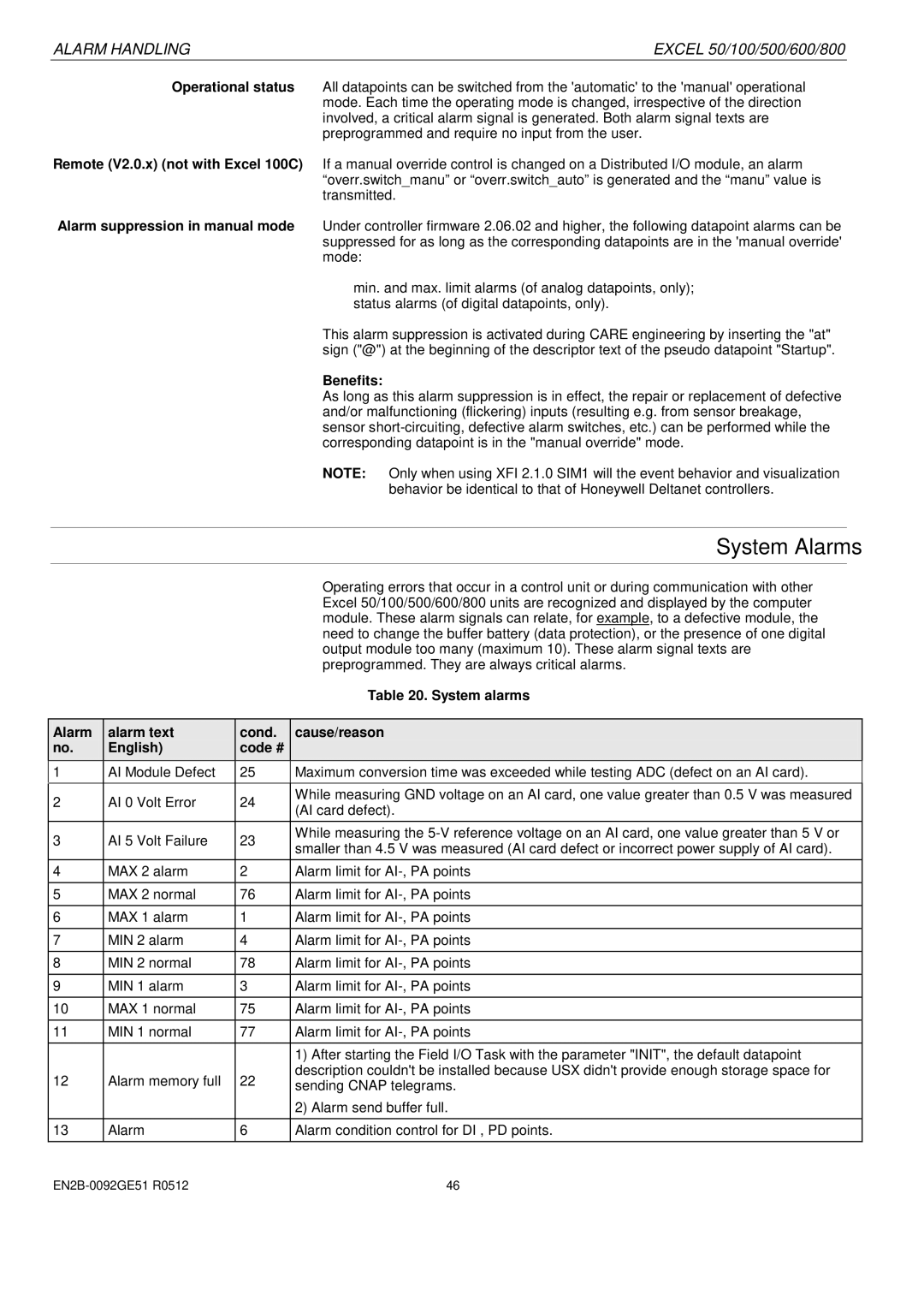ALARM HANDLING | EXCEL 50/100/500/600/800 |
Operational status All datapoints can be switched from the 'automatic' to the 'manual' operational mode. Each time the operating mode is changed, irrespective of the direction involved, a critical alarm signal is generated. Both alarm signal texts are preprogrammed and require no input from the user.
Remote (V2.0.x) (not with Excel 100C) If a manual override control is changed on a Distributed I/O module, an alarm “overr.switch_manu” or “overr.switch_auto” is generated and the “manu” value is transmitted.
Alarm suppression in manual mode Under controller firmware 2.06.02 and higher, the following datapoint alarms can be suppressed for as long as the corresponding datapoints are in the 'manual override' mode:
• min. and max. limit alarms (of analog datapoints, only);
• status alarms (of digital datapoints, only).
This alarm suppression is activated during CARE engineering by inserting the "at" sign ("@") at the beginning of the descriptor text of the pseudo datapoint "Startup".
Benefits:
As long as this alarm suppression is in effect, the repair or replacement of defective and/or malfunctioning (flickering) inputs (resulting e.g. from sensor breakage, sensor
NOTE: Only when using XFI 2.1.0 SIM1 will the event behavior and visualization
behavior be identical to that of Honeywell Deltanet controllers.
System Alarms
|
|
| Operating errors that occur in a control unit or during communication with other | |
|
|
| Excel 50/100/500/600/800 units are recognized and displayed by the computer | |
|
|
| module. These alarm signals can relate, for example, to a defective module, the | |
|
|
| need to change the buffer battery (data protection), or the presence of one digital | |
|
|
| output module too many (maximum 10). These alarm signal texts are | |
|
|
| preprogrammed. They are always critical alarms. | |
|
|
| Table 20. System alarms | |
|
|
|
| |
Alarm | alarm text | cond. | cause/reason | |
no. | English) | code # |
| |
1 | AI Module Defect | 25 | Maximum conversion time was exceeded while testing ADC (defect on an AI card). | |
|
|
|
| |
2 | AI 0 Volt Error | 24 | While measuring GND voltage on an AI card, one value greater than 0.5 V was measured | |
(AI card defect). | ||||
|
|
| ||
3 | AI 5 Volt Failure | 23 | While measuring the | |
smaller than 4.5 V was measured (AI card defect or incorrect power supply of AI card). | ||||
|
|
| ||
4 | MAX 2 alarm | 2 | Alarm limit for | |
5 | MAX 2 normal | 76 | Alarm limit for | |
|
|
|
| |
6 | MAX 1 alarm | 1 | Alarm limit for | |
7 | MIN 2 alarm | 4 | Alarm limit for | |
8 | MIN 2 normal | 78 | Alarm limit for | |
|
|
|
| |
9 | MIN 1 alarm | 3 | Alarm limit for | |
10 | MAX 1 normal | 75 | Alarm limit for | |
11 | MIN 1 normal | 77 | Alarm limit for | |
|
|
|
| |
|
|
| 1) After starting the Field I/O Task with the parameter "INIT", the default datapoint | |
12 | Alarm memory full | 22 | description couldn't be installed because USX didn't provide enough storage space for | |
sending CNAP telegrams. | ||||
|
|
| ||
|
|
| 2) Alarm send buffer full. | |
|
|
|
| |
13 | Alarm | 6 | Alarm condition control for DI , PD points. |
46 |
